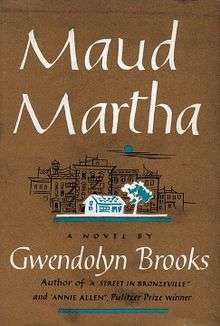Maud Martha

Maud Martha is the only novella written by Pulitzer Prize winning African American poet Gwendolyn Brooks. Published in 1953 by Harper & Brothers and reprinted by Third World Press, it includes a series of vignettes following the title character Maud Martha as she negotiates the passage from childhood to adulthood in black Chicago neighbourhoods.[1][2]
Style
Structurally, the novel has a nonlinear narrative, that also is explained in poetic language unusual to novels. Rather, as critic GerShun Avilez describes it, it is a "fragmentary poetic narrative."[3] Other critics focus on its artistic connection to Brook's poetry; Asali Solomon highlighted the language of the novel saying that it is good at "gracefully evoking the nastiness of life."[1]
Reception
Reviewing the novel for NPR in 2006, Asali Solomon said the character's life "resembles your life or mine: good days and bad, no headlines."[1]
References
- 1 2 3 Solomon, Asali. "Gwendolyn Brooks' Indispensable 'Maud Martha'". NPR.org. Retrieved 2014-04-16.
- ↑ Taylor, Elizabeth (February 13, 2010). ""Maud Martha" by Gwendolyn Brooks". Chicago Tribune. Retrieved 2014-04-16.
- ↑ Avilez 142.
Further reading
- Avilez, GerShun (Spring 2008). "Housing the Black Body: Value, Domestic Space, and Segregation Narratives". African American Review (Representing Segregation ed.). 42 (1): 135–147. JSTOR 40301309.
- Bryant, Jacqueline (2002). Gwendolyn Brooks' Maud Martha: A Critical Collection. Third World Press.
- Bubíková, Šárk (2011). "Maud Martha and the tradition of the Ethnic Female Bildungsroman". Litteraria Pragensia. 21 (41).
- Rabinowitz, Paula (Spring 2001). "Domestic Labor: Film Noir, Proletarian Literature, and Black Women's Fiction". MFS Modern Fiction Studies. 47 (1): 229–254. doi:10.1353/mfs.2001.0009.
- `Shaw, Harry B. (1996). "Maud Martha". In Stephen Caldwell Wright. On Gwendolyn Brooks. U of Michigan P. pp. 124–37.